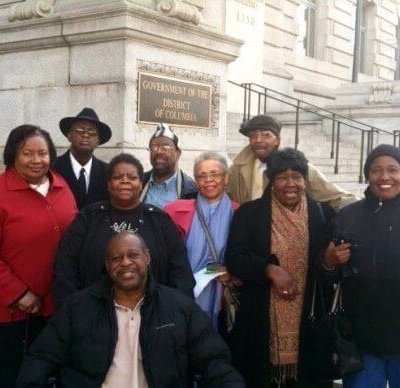Government Lawyers, Meet Your Pro Bono Clients
Government lawyers often hesitate to do pro bono work, since the navigating the ethics questions and potential conflicts can feel like too big an obstacle. But the federal government has made tremendous strides in helping government attorneys take pro bono cases, and DC’s legal services providers now provide many opportunities. On January 13, a lively bunch of government lawyers spent lunchtime at DOJ’s Patrick Henry Building to learn how to provide pro bono legal services to low-income DC residents. We convened this year’s Government Pro Bono Roundtable to encourage government attorneys to take the plunge and do pro bono work. Julie Abbate, a DOJ lawyer and a member of our board, moderated a panel featuring Joey Bowers (DOJ), Nicole Murley (also DOJ), Laura Klein (DOJ’s Pro Bono Program Manager), and Scott Risner (USAID). The panelists, who are pro bono veterans, shared tips for finding pro bono opportunities and explored ways to make the pro bono experience meaningful and productive. Among their suggestions: Seek out training: organizations like the DC Bar and, ahem, Washington Council of Lawyers offer many useful training sessions; Most legal services organizations provide a mentor to government attorneys taking on pro bono cases; Don’t be shy about letting your colleagues know that you are working on a pro bono case, and be sure to let your clients know that you have other cases and may not be able to respond to them immediately; If you don’t have the time to commit to a full case at the moment, consider a discrete opportunity like the DC Bar’s Advice & Referral Clinic. As it turns out, we’ll be leading a volunteer group to this clinic on the morning of Saturday, February 14. Finally, you can learn more at probono.net, which has a dedicated page for Federal Government Pro Bono Attorneys. Doing pro bono work can be invigorating. You get to learn about a new area of law and keep your practice vibrant. It’s work, of course, but it’s rewarding work. And it’s an ethical responsibilty. So if you’re a government attorney, we hope that a rewarding pro bono case is in your future! (We’d like to thank Red Velvet Cupcakery for providing cupcakes for the event. As it turns out, pro bono work is good for both the soul and the stomach.) Lydia C. Watts is our Associate Director. You can follow her on Twitter at @lydiawatts.







